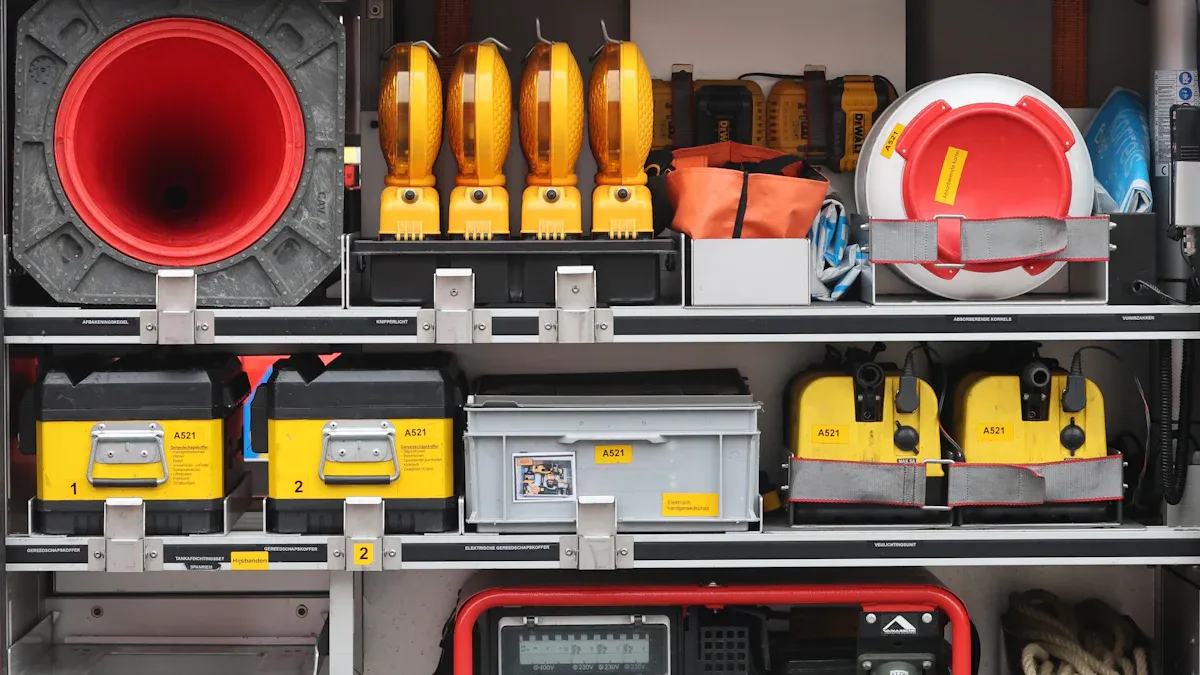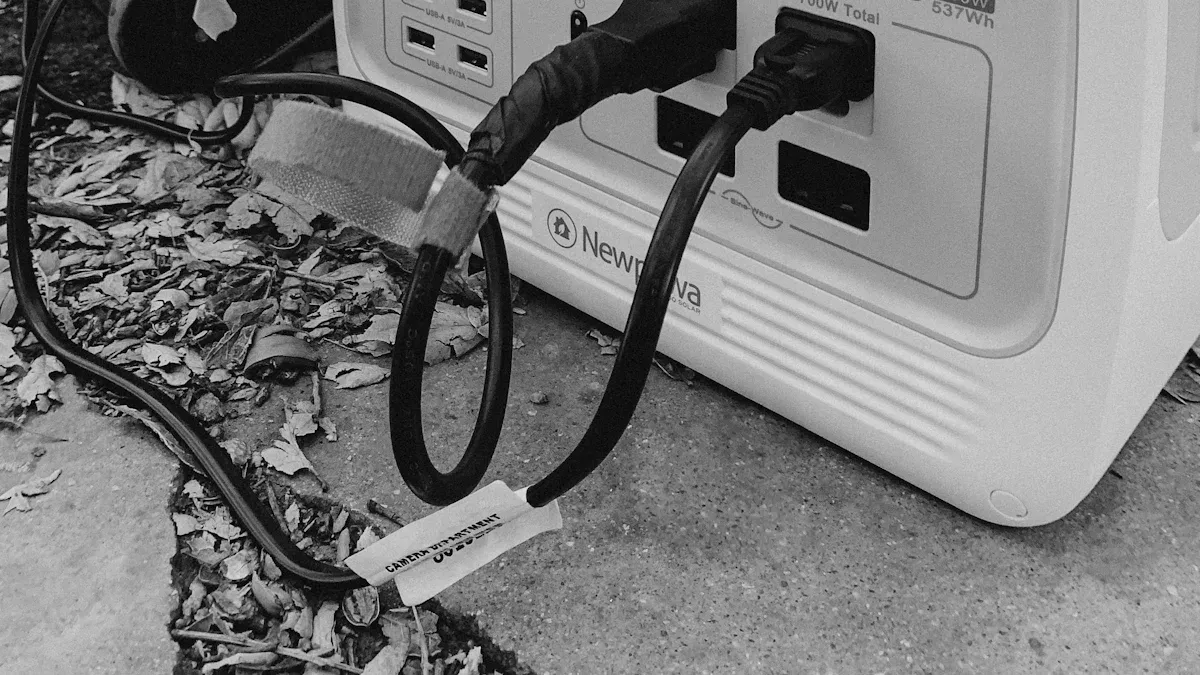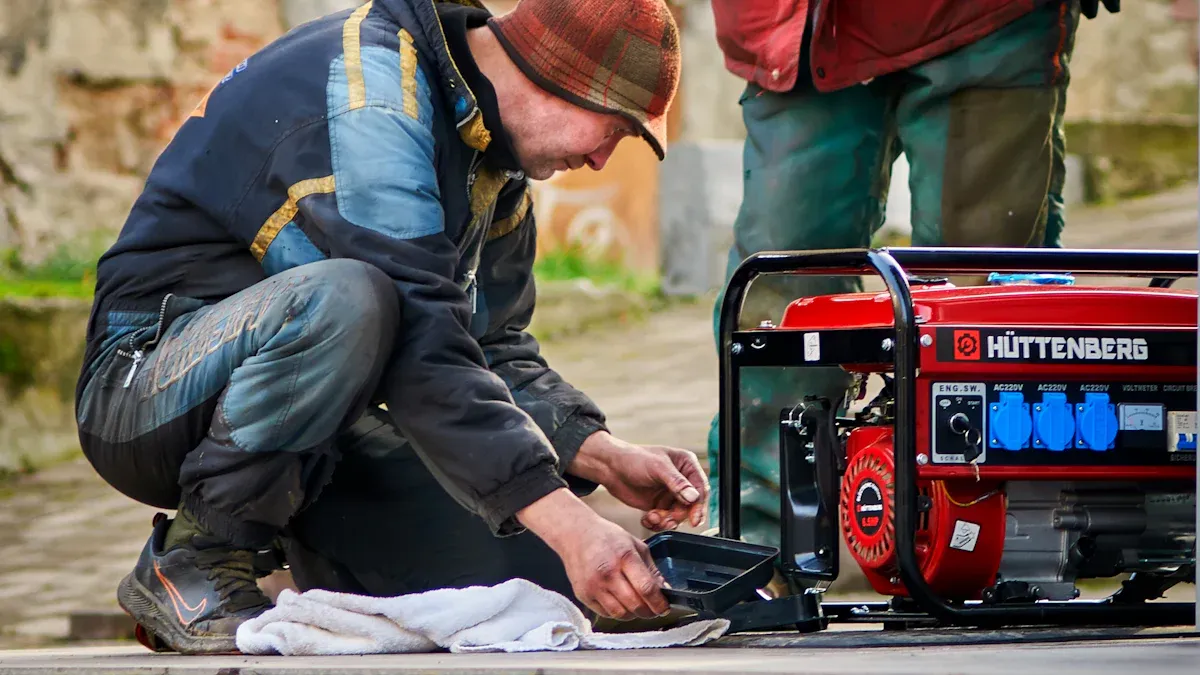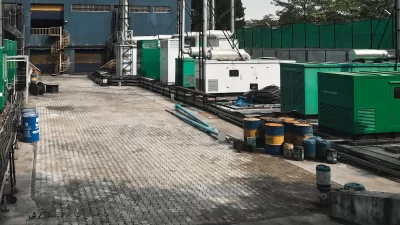
Are you searching for a reliable way to keep your home or business running during unexpected outages? Certified second-hand generators offer strong performance and real value for Emergency Backup Power. You get safety and dependability when you choose certified options. Always check the certification, review maintenance records, and buy from trusted sources.
Consejo: Certified generators give you peace of mind when you need power the most.
Principales conclusiones
Certified second-hand generators provide reliable and safe backup power during outages, meeting strict quality and environmental standards.
Buying certified models saves money compared to new units while offering strong performance and warranties for peace of mind.
Always check certification marks, maintenance records, and buy from trusted dealers to ensure quality and avoid surprises.
Regular maintenance and testing keep your generator ready and extend its lifespan, protecting your investment.
Choose the right size generator for your needs and follow safety tips to keep your home or business safe during power outages.
Certified Generators

Definition
Certified second-hand generators give you a dependable way to keep your lights on when the power goes out. You can use these generators for standby, emergency, or portable power. Homeowners often choose them to protect their families during storms or blackouts. Small business owners rely on them to keep operations running and avoid costly downtime. Certified second-hand generators have passed strict tests. They meet safety and performance standards set by trusted organizations. When you pick a certified model, you know it has been checked for quality and reliability.
Certification Process
You want to make sure your generator will work when you need it most. The certification process checks every important part of a second-hand generator. Trained professionals inspect, test, and repair each unit before it gets certified. They follow rules from the Environmental Protection Agency (EPA) and other safety groups. These rules cover emissions, safety, and performance.
Here is a table that shows some key steps and requirements in the certification process:
Step/Requirement | Description | EPA Regulation(s) and CFR Citation(s) |
|---|---|---|
Personnel Training | Workers get training on emergency procedures and hazardous waste management. | §262.16(b)(9)(iii), §262.17(a)(7) |
Contingency Plan and Emergency Procedures | Companies create plans for unexpected events and emergencies. | §§262.16(b)(9), Part 262 subpart M (§262.17(a)(6)) |
Preparedness and Prevention | Teams set up steps to prevent accidents during emergencies. | §262.16(b)(8)-(9), Part 262 subpart M (§262.17(a)(6)) |
Air Emissions Control | Generators must control harmful air emissions. | Part 265 subparts AA, BB, CC (from §262.17(a)(1) and (2)) |
Land Disposal Restrictions | Units must meet rules for safe waste disposal and proper documentation. | Part 268 (from §262.16(b)(7) and §262.17(a)(9)) |
Manifest Tracking | Companies track hazardous waste shipments with official forms. | Part 262 subpart B |
Waste Minimization | Efforts are made to reduce hazardous waste. | §262.27 |
Pre-Transport Requirements | Proper packaging and labeling before shipping. | §§262.30-262.33 |
Reporting Requirements | Regular reports are filed about waste shipments and exceptions. | §§262.41, 262.42(b), 262.43 |
Recordkeeping | All records of testing, shipments, and reports are kept safe. | §262.11(f), §262.40 |
Facility Type Compliance | Only approved facilities can handle the waste. | §§262.14(a)(5), Parts 264/265, 266/267, 270 |
Closure Procedures | Equipment must be cleaned and closed properly at the end of use. | §262.16(b)(3)(vi), Part 265 subpart W and DD |
Nota: Certified generators go through these steps to make sure they meet all legal and safety standards. This process protects you and the environment.
Quality and Safety
You deserve a generator that works every time you need it. Certification gives you that confidence. Certified second-hand generators must pass tough inspections. Experts check for worn parts, leaks, and electrical problems. They test the generator under load to make sure it can handle real emergencies. Certified models also meet EPA rules for emissions, so you help protect the air while keeping your power on.
When you choose a certified generator, you lower your risk of breakdowns and accidents. You also make sure your generator follows local laws and insurance requirements. This means you get reliable Emergency Backup Power without worry. Certified second-hand generators give you peace of mind and real value for your money.
Emergency Backup Power Benefits

Cost Savings
You want to save money while keeping your home or business safe. Certified second-hand generators help you do just that. You pay less for a used generator than for a new one. You also avoid the high costs of power outages, like spoiled food or lost business. Many certified models come with warranties, so you do not risk expensive repairs.
Lower upfront cost than new generators
Reduced risk of emergency expenses
Warranties and support often included
Consejo: Choose a certified second-hand generator to stretch your budget and protect your investment.
Performance
You need Emergency Backup Power that works every time. Certified second-hand generators deliver strong and steady performance. Experts test each unit under real conditions before certification. You get a generator that starts quickly and runs smoothly during outages. Certified models often match the power and reliability of new units.
A certified generator gives you:
Fast startup during emergencies
Reliable power for your most important devices
Confidence that your backup system will not fail
You can trust your Emergency Backup Power to keep your lights on and your business running.
Environmental Impact
You care about the environment. Certified second-hand generators help you make a greener choice. By choosing a used generator, you reduce waste and keep equipment out of landfills. Certified models meet strict EPA standards for emissions. You help protect the air and reduce your carbon footprint.
Benefit | How You Help the Environment |
|---|---|
Reuse | Less waste in landfills |
EPA-certified emissions | Cleaner air for your community |
Efficient operation | Lower fuel use and pollution |
Nota: Every certified generator you buy supports a cleaner, more sustainable future.
Buying Guide
What to Check
You want a generator that works when you need it. Start by checking the basics. Look at the generator’s age and the number of hours it has run. Newer units with fewer hours often last longer. Review the maintenance history. Well-kept records show the generator has received proper care.
Use this checklist before you buy:
Visual Inspection: Check the outside for dents, leaks, or rust. Make sure all wires and bolts are tight and clean.
Fluid Levels and Quality: Look at oil, coolant, and fuel. Clean fluids mean the engine stays healthy.
Battery and Electrical Systems: Test the battery. Make sure all electrical parts work and show no signs of corrosion.
Filters: Ask if air and fuel filters have been changed on schedule.
Load Bank Testing: Confirm the generator has passed a load test. This test shows the generator can handle real power needs.
Professional Inspections: Look for reports from certified technicians. These reports should cover wiring, controls, and other key parts.
Ask to see all maintenance records. These records prove the generator has been checked and fixed when needed. Good records mean fewer surprises and more reliable Emergency Backup Power.
Consejo: A generator with a clear maintenance history gives you peace of mind.
Certification Marks
You need to spot real certification marks. These marks show the generator meets safety and environmental rules. Look for labels from the EPA or other trusted groups. The label should list the model, serial number, and date of certification. If you do not see a clear mark, ask the seller for proof.
Certification Mark | What It Means |
|---|---|
EPA | Meets emission standards |
UL | Passes safety requirements |
CSA | Approved for North America |
Nota: Only buy a generator with a visible, valid certification mark.
Reputable Dealers
Choose a dealer you can trust. Reputable dealers offer certified second-hand generators and stand behind their products. They provide full maintenance records and answer your questions. Look for dealers with good reviews and a long history in the business.
Ask for references from past customers.
Check online ratings and reviews.
Visit the dealer’s location if possible.
A good dealer will help you pick the right generator for your needs. They will not rush you or hide information.
Warranty and Support
You want support after you buy. Many certified second-hand generators come with a warranty. This warranty covers repairs if something goes wrong. Ask the dealer what the warranty includes and how long it lasts. Some dealers also offer service plans for regular checkups.
Read the warranty details before you buy.
Ask about support for parts and repairs.
Choose a dealer who offers help when you need it.
Alert: A strong warranty and good support protect your investment and keep your Emergency Backup Power ready.
Common Concerns
Safety
You want to keep your family or business safe during a power outage. Certified second-hand generators help you do that. Experts inspect these units for leaks, faulty wiring, and worn parts. They test each generator under real conditions. You get a machine that meets strict safety rules. You avoid the risks of fire, carbon monoxide, or electrical shock. Always place your generator outside, away from windows and doors. Use heavy-duty extension cords and never overload the system.
Consejo: Ask your dealer for a safety checklist. Follow it every time you use your generator.
Lifespan
You may wonder how long a certified second-hand generator will last. The answer depends on care and usage. Well-maintained diesel generators can run between 10,000 and 30,000 hours before needing a major overhaul. That means years of reliable backup power for your home or business. Overuse can shorten the life, but underuse can also cause problems. Regular use and proper maintenance keep your generator in top shape.
Aspecto | Details |
|---|---|
Lifespan Estimate | Well-maintained diesel generators last 10,000 to 30,000 hours before major overhaul needed. |
Factors Affecting Lifespan | Overuse shortens lifespan. Underuse causes friction issues on startup. |
Maintenance Recommendations | Regular servicing, oil checks, quality fluids, load bank testing, avoid wet stacking. |
Certified Second-Hand Generators | Cost-effective and durable when sourced from trusted vendors. |
You get the best value when you buy from a reputable dealer who verifies age, hours, and specs.
Service and Parts
You want your generator to work every time you need it. Certified second-hand generators make service easy. Many models use common parts that you can find at local stores or order online. Reputable dealers offer support and can help you find the right parts. Regular service keeps your generator running smoothly. Schedule oil changes, replace filters, and test your unit often.
Ask your dealer about service plans.
Keep a log of all maintenance.
Replace worn parts before they fail.
Nota: Reliable service and easy access to parts protect your investment and keep your power on when it matters most.
Step-by-Step Purchase
Assess Needs
Start by thinking about what you need. Make a list of the devices and systems you want to power during an outage. Write down the wattage for each item. Add up the total. This number tells you the size of the generator you need. Decide if you want a portable or standby model. Portable units work well for a few key items. Standby generators power your whole home or business.
Consejo: Always choose a generator with a little more capacity than you think you need. This keeps your system safe and ready for extra demands.
Where to Buy
You want to buy from a trusted source. Look for certified dealers who specialize in second-hand generators. Visit their store or website. Check if they have clear certification marks and maintenance records. Avoid private sellers who cannot show proof of certification.
Places to consider:
Authorized generator dealers
Reputable online marketplaces with reviews
Local equipment suppliers with service departments
Nota: Certified dealers offer support and warranties. You get peace of mind and real value.
Questions to Ask
Ask smart questions before you buy. You deserve clear answers.
Is this generator certified by the EPA or another trusted group?
How many hours has it run?
Can I see the maintenance records?
Has it passed a recent load test?
What warranty do you offer?
Do you provide service and parts?
Write down the answers. Compare them with other options. Choose the generator that fits your needs and budget.
After Purchase
Take action after you buy your generator. Read the manual. Learn how to start and stop the unit. Schedule regular maintenance. Keep a log of service and repairs. Test your generator every month. Store fuel safely and follow all safety tips.
Alert: Regular testing and care keep your generator ready for any emergency. Protect your investment and stay prepared!
You make a smart choice when you pick certified second-hand generators for Emergency Backup Power. You save thousands by choosing portable units with manual transfer switches instead of costly permanent systems. Certified equipment gives you safety, quality, and peace of mind. Reliable backup power keeps your business open and your home safe during outages. Use this guide to find trusted dealers and certified models. Take action now and protect what matters most.
PREGUNTAS FRECUENTES
How do I know if a second-hand generator is truly certified?
Look for official certification marks like EPA, UL, or CSA on the generator. Ask the dealer for proof and check the paperwork. You deserve real certification for safety and reliability.
Consejo: Never buy a generator without visible certification labels.
Can I install a certified second-hand generator myself?
You should hire a licensed electrician for installation. This keeps you safe and ensures your generator works correctly. Professional installation also protects your warranty.
Safe setup
Warranty protection
Peace of mind
How often should I service my certified second-hand generator?
Service your generator every six months or after each use. Regular oil changes, filter replacements, and load tests keep your unit ready for emergencies. You protect your investment with routine care.
Are parts for certified second-hand generators easy to find?
Yes! Most certified second-hand generators use common parts. You can find them at local stores or online. Reputable dealers help you get the right parts fast.
Nota: Easy access to parts means less downtime for you.

